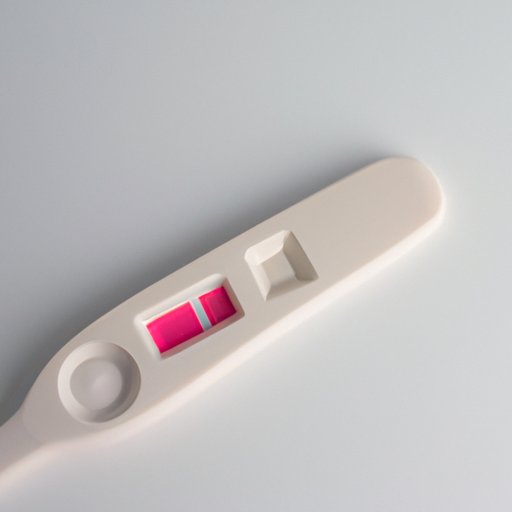
Introduction
For women who are trying to conceive or suspect they might be pregnant, the question of when to take a pregnancy test is a common one. Many wonder if taking a test before their missed period is accurate. In this article, we will explore the science behind pregnancy testing and provide guidance on when and how to test for accurate results.
Early Pregnancy Testing: Is it Accurate Before a Missed Period?
There are two main types of early pregnancy tests available: urine tests and blood tests. Both tests work by detecting the hormone human chorionic gonadotropin (hCG), which is produced by the placenta after a fertilized egg implants in the uterus.
Research suggests that early pregnancy tests can accurately detect hCG in a woman’s urine or blood as early as 7-10 days after ovulation. However, testing too early can result in false negatives, as the levels of hCG may not be high enough to detect in a test. For the most accurate results, it’s best to wait until after a missed period to take a pregnancy test.
The Pros and Cons of Taking a Pregnancy Test Before Your Missed Period
There are potential benefits to taking a pregnancy test before a missed period, including early detection and the ability to start prenatal care sooner. However, there are also drawbacks and limitations to consider. False negatives are more common before a missed period, which can lead to increased anxiety and uncertainty. It’s important to weigh these pros and cons before deciding when to take a pregnancy test.
Understanding the Science Behind Pregnancy Tests: When Can You Test?
Pregnancy tests work by detecting the presence of hCG in a woman’s urine or blood. After a fertilized egg implants in the uterus, hCG levels begin to rise. For the most accurate results, it’s recommended to wait at least until the first day of a missed period to take a test. However, the timing of ovulation and implantation can vary from woman to woman, so it’s important to keep track of your menstrual cycle and any potential ovulation symptoms to determine the best time for testing.
The Truth About Early Pregnancy Symptoms and Testing
Early pregnancy symptoms can include fatigue, nausea, breast tenderness, and frequent urination. However, these symptoms can also be caused by other factors and are not always reliable indicators of pregnancy before a missed period. It’s important to assess symptoms in conjunction with early pregnancy testing for a more accurate assessment of pregnancy status.
Breaking Down Pregnancy Test Results: How to Interpret Early Testing
When taking a pregnancy test before a missed period, it’s important to understand the different types of tests and how to interpret their results. Some tests are more sensitive than others and can detect hCG at lower levels. It’s also important to read the instructions carefully to ensure accurate testing and interpretation of results.
The Emotional Roller Coaster of Early Pregnancy Testing
Taking a pregnancy test before a missed period can be a roller coaster of emotions, including anxiety, excitement, and disappointment. It’s important to prepare for any outcome and to have a support network in place. Coping strategies such as self-care, mindfulness, and seeking professional support can be helpful during this time.
Pregnancy Testing Before Your Missed Period: What Your Doctor Wants You to Know
Healthcare professionals generally recommend waiting until after a missed period to take a pregnancy test for the most accurate results. However, they also acknowledge that early testing can have potential benefits in terms of early detection and prenatal care. Women who are considering early pregnancy testing should have a conversation with their healthcare provider to weigh the pros and cons and to determine the best course of action for their individual situation.
Conclusion
Early pregnancy testing can be a valuable tool for women who are trying to conceive or suspect they might be pregnant. However, the accuracy of testing before a missed period can be limited, and it’s important to weigh the pros and cons before making a decision. By understanding the science behind pregnancy testing, timing testing appropriately, and having a support system in place, women can navigate the emotional and physical aspects of early pregnancy testing with greater ease.




